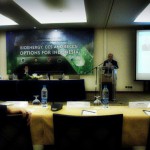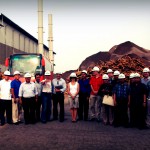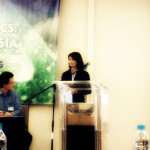 Carbon Capture and Storage (CCS), Bioenergy, and BECCS as the combination of the former two, are the emerging energy and technology options that can contribute to the effort in the climate change mitigation. To support the dissemination of these option to stakeholders in Indonesia, UKP4 in collaboration with ESDM, IEA, IIASA, and SBM ITB, held a three-day workshop in Jakarta (21/9/2012). A workshop titled “Bioenergy, CCS, and BECCS: Options for Indonesia” was then followed by a site visit to a Biomass power plant owned by PT Growth Asia in Medan (23/9/2012). Opened by Professor Kuntoro Mangkusubroto as the Head of UKP4 and founder of SBM ITB, this workshop was also a follow-up action from the previous Expert’s meeting on BECCS in Austria November 2011.
Carbon Capture and Storage (CCS), Bioenergy, and BECCS as the combination of the former two, are the emerging energy and technology options that can contribute to the effort in the climate change mitigation. To support the dissemination of these option to stakeholders in Indonesia, UKP4 in collaboration with ESDM, IEA, IIASA, and SBM ITB, held a three-day workshop in Jakarta (21/9/2012). A workshop titled “Bioenergy, CCS, and BECCS: Options for Indonesia” was then followed by a site visit to a Biomass power plant owned by PT Growth Asia in Medan (23/9/2012). Opened by Professor Kuntoro Mangkusubroto as the Head of UKP4 and founder of SBM ITB, this workshop was also a follow-up action from the previous Expert’s meeting on BECCS in Austria November 2011.
 Carbon Capture and Storage (CCS), Bioenergy, and BECCS as the combination of the former two, are the emerging energy and technology options that can contribute to the effort in the climate change mitigation. To support the dissemination of these option to stakeholders in Indonesia, UKP4 in collaboration with ESDM, IEA, IIASA, and SBM ITB, held a three-day workshop in Jakarta (21/9/2012). A workshop titled “Bioenergy, CCS, and BECCS: Options for Indonesia” was then followed by a site visit to a Biomass power plant owned by PT Growth Asia in Medan (23/9/2012). Opened by Professor Kuntoro Mangkusubroto as the Head of UKP4 and founder of SBM ITB, this workshop was also a follow-up action from the previous Expert’s meeting on BECCS in Austria November 2011.
Carbon Capture and Storage (CCS), Bioenergy, and BECCS as the combination of the former two, are the emerging energy and technology options that can contribute to the effort in the climate change mitigation. To support the dissemination of these option to stakeholders in Indonesia, UKP4 in collaboration with ESDM, IEA, IIASA, and SBM ITB, held a three-day workshop in Jakarta (21/9/2012). A workshop titled “Bioenergy, CCS, and BECCS: Options for Indonesia” was then followed by a site visit to a Biomass power plant owned by PT Growth Asia in Medan (23/9/2012). Opened by Professor Kuntoro Mangkusubroto as the Head of UKP4 and founder of SBM ITB, this workshop was also a follow-up action from the previous Expert’s meeting on BECCS in Austria November 2011.
 The main objective of this workshop was to explore the potential integration of these three options into Indonesia’s energy policy. The first day of the workshop mainly discussed about understanding of BECCS in which was still a relatively new option compared to Bioenergy and CCS, as well as, how to integrate BECCS as part of energy policy in Indonesia. On the second day, the workshop went to discuss a financing for BECCS and those potential projects to implement BECCS in Indonesia. International speakers participated in the workshop was Wolf Heidug and Denis Best from the International Energy Agency – IEA as well as Florian Kraxner, Michael Obersteiner, and Sabine Fuss from the International Institute for Applied Systems Analysis – IIASA. The workshop was then followed by site visit to a biomass power plant in Medan, North Sumatra. The power plant that was built by PT Growth Asia, is mainly fueled with palm shells combined with rice husk, corn stalks, sawdust, used wood and bagasse.
The main objective of this workshop was to explore the potential integration of these three options into Indonesia’s energy policy. The first day of the workshop mainly discussed about understanding of BECCS in which was still a relatively new option compared to Bioenergy and CCS, as well as, how to integrate BECCS as part of energy policy in Indonesia. On the second day, the workshop went to discuss a financing for BECCS and those potential projects to implement BECCS in Indonesia. International speakers participated in the workshop was Wolf Heidug and Denis Best from the International Energy Agency – IEA as well as Florian Kraxner, Michael Obersteiner, and Sabine Fuss from the International Institute for Applied Systems Analysis – IIASA. The workshop was then followed by site visit to a biomass power plant in Medan, North Sumatra. The power plant that was built by PT Growth Asia, is mainly fueled with palm shells combined with rice husk, corn stalks, sawdust, used wood and bagasse.
It is expected that the BECCS implementation in Indonesia can be initiated by creating networks involving all relevant decision-makers such as UKP4, related ministries as well as academicians and practitioners. The upcoming Expert’s Workshop on BECCS will be held in Brazil in 2013 with focus on Indonesia, Brazil, and China.
 This workshop is also a part of a joint effort between UKP4 and SBM ITB to implement a triple helix model for supporting the development of national policies. As widely known, the triple helix model has emerged from the needs of universities to work closely with the industry, with the support from the government as the policy maker. As the model evolved, government’s role is not only as a support act anymore but also as an active actor in the triple helix model especially in facilitating communication and cooperation among researchers in academic institutions, practitioners in industry and business, and decision makers in government (e.g. ministries, agencies), especially in the sectors included in the 11 national priorities such as poverty eradication, food security, energy, environment conservation and disaster management.
This workshop is also a part of a joint effort between UKP4 and SBM ITB to implement a triple helix model for supporting the development of national policies. As widely known, the triple helix model has emerged from the needs of universities to work closely with the industry, with the support from the government as the policy maker. As the model evolved, government’s role is not only as a support act anymore but also as an active actor in the triple helix model especially in facilitating communication and cooperation among researchers in academic institutions, practitioners in industry and business, and decision makers in government (e.g. ministries, agencies), especially in the sectors included in the 11 national priorities such as poverty eradication, food security, energy, environment conservation and disaster management.
The international exposure of the workshop has contributed to the effort in establishing SBM ITB’s strong presence in both business and government as one forward step toward a world class business school. Similarly, collaboration with high-caliber international agencies such as IEA and IIASA is also in line with internationalization vision of SBM ITB.
 The main objective of this workshop was to explore the potential integration of these three options into Indonesia’s energy policy. The first day of the workshop mainly discussed about understanding of BECCS in which was still a relatively new option compared to Bioenergy and CCS, as well as, how to integrate BECCS as part of energy policy in Indonesia. On the second day, the workshop went to discuss a financing for BECCS and those potential projects to implement BECCS in Indonesia. International speakers participated in the workshop was Wolf Heidug and Denis Best from the International Energy Agency – IEA as well as Florian Kraxner, Michael Obersteiner, and Sabine Fuss from the International Institute for Applied Systems Analysis – IIASA. The workshop was then followed by site visit to a biomass power plant in Medan, North Sumatra. The power plant that was built by PT Growth Asia, is mainly fueled with palm shells combined with rice husk, corn stalks, sawdust, used wood and bagasse.
The main objective of this workshop was to explore the potential integration of these three options into Indonesia’s energy policy. The first day of the workshop mainly discussed about understanding of BECCS in which was still a relatively new option compared to Bioenergy and CCS, as well as, how to integrate BECCS as part of energy policy in Indonesia. On the second day, the workshop went to discuss a financing for BECCS and those potential projects to implement BECCS in Indonesia. International speakers participated in the workshop was Wolf Heidug and Denis Best from the International Energy Agency – IEA as well as Florian Kraxner, Michael Obersteiner, and Sabine Fuss from the International Institute for Applied Systems Analysis – IIASA. The workshop was then followed by site visit to a biomass power plant in Medan, North Sumatra. The power plant that was built by PT Growth Asia, is mainly fueled with palm shells combined with rice husk, corn stalks, sawdust, used wood and bagasse.
It is expected that the BECCS implementation in Indonesia can be initiated by creating networks involving all relevant decision-makers such as UKP4, related ministries as well as academicians and practitioners. The upcoming Expert’s Workshop on BECCS will be held in Brazil in 2013 with focus on Indonesia, Brazil, and China.
 This workshop is also a part of a joint effort between UKP4 and SBM ITB to implement a triple helix model for supporting the development of national policies. As widely known, the triple helix model has emerged from the needs of universities to work closely with the industry, with the support from the government as the policy maker. As the model evolved, government’s role is not only as a support act anymore but also as an active actor in the triple helix model especially in facilitating communication and cooperation among researchers in academic institutions, practitioners in industry and business, and decision makers in government (e.g. ministries, agencies), especially in the sectors included in the 11 national priorities such as poverty eradication, food security, energy, environment conservation and disaster management.
This workshop is also a part of a joint effort between UKP4 and SBM ITB to implement a triple helix model for supporting the development of national policies. As widely known, the triple helix model has emerged from the needs of universities to work closely with the industry, with the support from the government as the policy maker. As the model evolved, government’s role is not only as a support act anymore but also as an active actor in the triple helix model especially in facilitating communication and cooperation among researchers in academic institutions, practitioners in industry and business, and decision makers in government (e.g. ministries, agencies), especially in the sectors included in the 11 national priorities such as poverty eradication, food security, energy, environment conservation and disaster management.
The international exposure of the workshop has contributed to the effort in establishing SBM ITB’s strong presence in both business and government as one forward step toward a world class business school. Similarly, collaboration with high-caliber international agencies such as IEA and IIASA is also in line with internationalization vision of SBM ITB.



